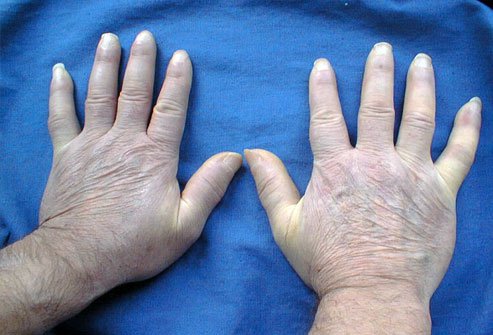Scleroderma is a progressive condition of the skin which becomes worse over a period of time. It can cause changes to the skin, muscles, blood vessels and internal organs. It results due to over-active immune system. The connective tissues become hard and tight due to the formation of fibrosis (scar tissue) in them.
There are many complications of scleroderma that cause a major impact on a person’s sense of well-being as patients are greatly concerned about the changes in their appearance, particularly those caused by the tightening of facial skin.
Prognosis is difficult to predict until the disease differentiates into recognizable subsets.

Scleroderma according to Ayurveda:
In Ayurveda, the main cause of scleroderma is identified as srotodushti (vitiation of the channels). There is a complex pathological process duly constituted by vitiated Vata by means of the affliction of Twak (skin) with the following samprapati ghataka (factors of pathogenesis):
- Vata-kapha pradhana (vitiation of Vata and Kapha doshas)
- Vitiated dhatu (body tissue) being Twak (skin), snayu (ligaments), sira (veins), kandara (tendons)
- Mandagni (low digestive fire) leading to the formation of Ama (unprocessed food)
Many srotas (body channels) are involved in the later stages with primary Rasavaha Srotodusti (morbid food carrying channels). The Doshakopa (aggravated body humor) begins at Amapakwashaya, moving through Rasayani (circulatory channels) and settling at Twak (skin).
Pulmonary hypertension, involvement of Sandhi (joints), Sira (blood vessels) and Snayu (ligaments) are considered as complications of Scleroderma.
Ayurvedic herbs are quite useful in the treatment of scleroderma as these herb act as Agnideepana (improving digestive fire), Aampachana (digesting the toxins) and correcting the immune system.
Some of the Herbs are:
- Ashwagandha (Withania somnifera): The roots of Ashwagandha possess many medicinal properties.
- It is considered as an adaptogen and this herb has a major effect on immune system, for building muscle strength, treatment of anxiety etc.
- The roots are antioxidant in nature.
- It improves the body’s defense against disease by improving the cell-mediated immunity.
- Ashwagandha also possesses antioxidant properties that help in protecting cellular damage caused by free radicals.
- Curcumin (Curcuma longa): Curcumin, commonly known as Turmeric has immense Ayurvedic properties.
- The anti-inflammatory and antioxidant of this golden spice protect the skin against oxidative damage and inflammation associated with scleroderma.
- Boswellia (Boswellia serrata): Boswellia is commonly known as Salai Guggul/Sallaki.
- It is generally used in Ayurveda for muscular and joint pains as it relieves pain, inflammation and improves joint mobility.
- It improves nourishment, cleanses wounds, useful in blood disorders.
- The resin of boswellia is good for skin.
- Shuddh Gandhak (Purified Sulphur): Shuddh Gandhak is an excellent rejuvenator which is quite effective in the treatment of skin and liver disorders.
- It flushes out toxins from the body and digestive and carminative.
- Erand (Castor): The roots, seeds and leaves of castor are extensively used in Ayurveda, both internally and externally.
- It has the property of balancing Vata and Kapha doshas.
- Being strong and piercing, it enters body’s minute channels and provides relief in the obstruction of body channels.
- Triphala: Triphala is a well-known herbal compound for flushing out toxins from the body. It is considered as a Tridosh Rasayana.
- The antioxidant, free radical scavenging, anti-inflammatory, immunomodulating, hepatoprotective properties make it a suitable herbal compound for scleroderma.
- Manjistha (Rubia cordifolia): In Ayurveda, manjistha holds the position of a very good skin care herb.
- It is described as rakta shodhaka (blood purifier) in Ayurveda.
- Due to its rakta-shodhaka property, it eliminates the toxins.
- The anti-inflammatory property of manjistha relieves inflammation and pain.
Some classical Ayurvedic formulations useful in the treatment of Scleroderma are:
- Gandhak Rasayan
- Sinhaad Guggul
- Sanjivani Vati
- Kaishore Guggul
These herbs and Ayurvedic formulations have immense health benefits for scleroderma patients but these must be consumed under the supervision of an Ayurvedic expert.
Disclaimer:-
This article is not a substitute to the standard Medical Diagnosis or personalized Ayurvedic Treatment! It is intended only for Information!
For experts consultation, please write us at care@blessayurveda.com.
2,318 total views, 4 views today